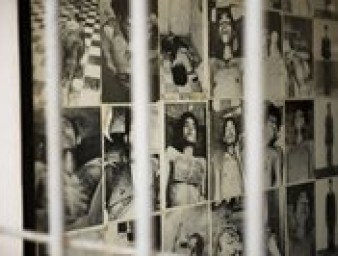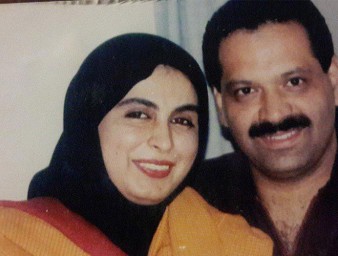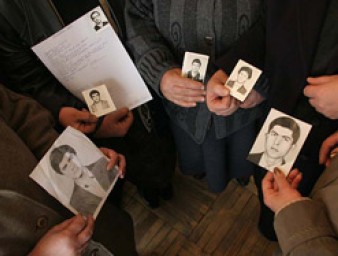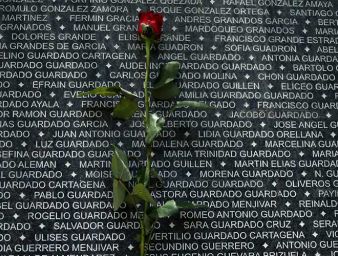“Where’s my stolen grandchild?” Argentina seeks truth, justice
30 August 2023

Buscarita Roa spent decades tirelessly searching for her missing son and granddaughter.
On November 28, 1978, a squad of Argentina’s military police stormed their home outside Buenos Aires and took the two, along with the child’s mother. It was in the midst of the South American country’s dictatorship, when thousands upon thousands of suspected leftists “disappeared” without a trace.
“They took away the three: my son, his wife and their baby girl, who was eight months old,” recounted Roa, who visited police stations, army camps, courts, prisons and churches, trying to find someone who would take notice. “It was a terrible search, but I kept on fighting, searching and searching for years.”
After seeking help from Mothers and Grandmothers of Plaza de Mayo, two Argentine human rights groups dedicated to finding relatives who disappeared during the 1976-1983 military regime, Roa finally learned the truth.
Her son and her daughter-in-law had been tortured and died in detention, while Claudia, the granddaughter, was illegally adopted by a childless colonel and his wife, one of the estimated 500 babies who were given to military families or friends of the regime, under new identities.
The grandchild Roa found was a woman in her 20s, Claudia, then living in a wealthy Buenos Aires district under the name of Mercedes, oblivious to her past.
“Finding my granddaughter after all these years was wonderful, but at first I couldn’t get too close,” said the 85-year-old Roa, describing how reforging their bond was a slow and sometimes painful process.
“I was blissful, but I had to be patient. I couldn’t invade my granddaughter’s life just like that. She needed to figure out the terrible truth and start trusting us.”
Stolen babies
More than 40 years after the return of democracy in Argentina, the country is still struggling with its traumatic past. As many as 30,000 people were tortured and killed during the seven-year regime.
But the junta’s brutality did not end there. Some of the kidnapped women were pregnant, and were kept alive only long enough to give birth. The babies were then given away to “politically acceptable” parents as part of what human rights groups call a systematic plan to steal and sell the stolen babies of its victims.
Enforced disappearance has frequently been used as a strategy to spread terror within societies and is not restricted to a specific region of the world. The disappearance of a child is a clear contravention of a number of provisions of the Convention on the Rights of the Child, including the right to a personal identity. The loss of a parent through disappearance is also a serious violation of a child’s human rights.
The International Day of the Victims of Enforced Disappearances is held every 30 August.
Grandmothers’ perseverance and science
In Argentina, mothers and grandmothers of the victims have played an instrumental role in discovering the whereabouts of those who disappeared, first organizing silent marches clad in white headscarves in front of the Government House, holding up pictures of loved ones.
Forensic genetics and advances in DNA analysis have proven a key human rights tool. Partnering with the non-profit Argentine Forensic Anthropology Team, Grandmothers of Plaza de Mayo mobilized a campaign to store blood from family members in the National Genetic Data Bank, which can match a person with his or her biological grandparents with an accuracy rate of 99,99 percent.
So far, Grandmothers have managed to find 133 out of the more than 500 missing grandchildren, including Claudia.
“We gave samples of our blood to help youngsters find the truth if they wanted to,” said Roa, who is now vice president of Grandmothers.

Buscarita Roa, of Grandmothers of Plaza de Mayo, a rights group dedicated to finding loved ones who disappeared during Argentina’s dictatorship. ©OHCHR
Manuel Gonçalves Granada is another former stolen baby. For 20 years, he lived under the identity of Claudio Novoa. Despite the silence that surrounded the crimes of the dictatorship, Gonçalves Granada always harbored doubts about his real identity, as he knew he was an adopted child.
At last, he approached Grandmothers to learn the identity of his biological parents.
“The Grandmothers were so perseverant in their struggle that they were able to break the silence,” said Gonçalves Granada, 47, who learned he was given away for adoption after his parents were kidnapped and killed in 1976.
“If it wasn’t for the Grandmothers’ fight, I would not know that I am Manuel. I would still be Claudio, and I would not be doing the work I do in search of truth and reparation,” said Gonçalves Granada, who now works for the association to help others find their true selves.
Rebuilding societies
Brazil, Chile, Paraguay and Uruguay also went through decades of military dictatorships in the second half of past century, when a regional system of terror and intelligence-sharing was put in place to crackdown on dissidents.
“Dictatorships in this region used torture and disappearances as preferred methods to inflict pain not only on opponents but their families and acquaintances,” Jan Jarab, the UN Human Rights regional representative for South America, said during a recent event in Chile on transitional justice to commemorate the end of the military regimes in the region.
High Commissioner Volker Türk said the rights to truth, justice, reparation and guarantees of non-repetition are essential for building a democratic and inclusive society.
“Memories of the past, even the most painful ones, can be the basis on which to rebuild societies,” Türk said in a video message. “By sharing and validating experiences, establishing the truth, fostering solidarity, and rebuilding the social fabric, we can continue to pave the way for healing and closure. Never more. My Office is by your side to support you."
As for Buscarita and Claudia, the two managed to rebuild their bond as grandmother and granddaughter, although the process was not always easy. After taking a DNA test, she learned that her real parents were José, a Chilean social activist, and Gertrudis. Claudia has compared the emotional shock of finding out her real identity to “having a rug pulled out from under my feet.”
Claudia slowly warmed up to Roa. After several invitations from her grandmother, Claudia at last agreed to come to her home for a mate (a popular herbal infusion in Argentina). Their meetings and conversations grew longer, until they became close. Roa today acts as a caring great-grandmother to Claudia’s children.
“More than 300 grandchildren are still missing,” Roa said. “Many grandmothers have passed away, and the rest of us are not getting any younger, but families cannot give up. We won’t stop until we find our last stolen grandson or granddaughter.”
Learn more about grandmothers using science to trace stolen babies. Watch this video.



